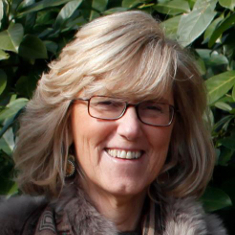 Inclusive Publishing has embarked on a series of interviews with industry leaders and their approach to accessibility. Cristina Mussinelli has championed inclusive publishing throughout much of her career and the work of the LIA Foundation has radically changed the way that mainstream accessibility is approached by publishers in Italy and abroad.
Inclusive Publishing has embarked on a series of interviews with industry leaders and their approach to accessibility. Cristina Mussinelli has championed inclusive publishing throughout much of her career and the work of the LIA Foundation has radically changed the way that mainstream accessibility is approached by publishers in Italy and abroad.
Producing accessible files means producing well-structured, high-quality publications that any reader can enjoy.
Please share with us the major achievements of the LIA Foundation to date
Firstly, we are very proud of the LIA catalogue which now hosts over 20.000 born accessible e-books produced by 73 Italian publishing imprints using mainstream production process and which are also distributed in the most important online retail outlets. Our hope is to add more and more publishers to this continually growing list so that we can, in the near future, offer print impaired people a complete catalogue of all new ebooks published in the Italian trade market.
In November 2017 we reached a great milestone. After many years of fruitful collaboration, Fondazione LIA – Libri Italiani Accessibili and the Italian Blind and Partially Sighted Union decided to strengthen their partnership with UICI becoming an institutional participant and electing the UICI president as the Fondazione LIA president. This collaboration confirms that if the publishing world and the organizations representing people with visual impairments work closely together, actions, projects and outcomes can be incredibly fruitful and effective.
Last, but not least, we are witnessing a growing interest towards accessibility from content producers, software houses and many others who are involved in the book supply chain. We will be working with them to make sure that accessibility is central in everyone’s publishing strategy.
Can you sum up the Foundation’s attitude towards inclusive publishing in one sentence.
I would like my catalogue to be everybody’s catalogue. I’d like to be able to choose just like everybody. I don’t want to be limited to specially made books but to be free to read like anybody else.
Mario Barbuto, President of the Italian Blind Union and now also of Fondazione LIA.
How has the work of the LIA Foundation affected the accessibility of mainstream publishing in Italy?
LIA has created an innovative service increasing the availability of mainstream accessible fiction and nonfiction titles in digital format (e-books) for blind and visually impaired readers.
To reach this target, LIA put in place true cultural change in the way accessibility is approached by Italian publishers. Accessibility is now considered integral to publishing production processes and is no longer thought of as an add-on feature. The LIA project has resulted in the production of accessible mainstream files with appropriate metadata attached being much higher on the agenda for publishers.
LIA has been a true revolution for more than 362,000 blind and 1,5 million visually impaired Italians who proved to be strong readers according to a 2011 survey carried out by LIA prior to the implementation of its mainstream accessibility model. Reading an average of 9 books every year, visually impaired readers consume three times more titles than the average domestic reader.
Do you have a top tip for publishers who are new to accessibility?
Just to not be afraid and to start the journey towards accessibility. Changing workflows and production habits, even slightly, can produce astonishing results. It is also worth mentioning that accessibility means quality. Producing accessible files means producing well-structured, high-quality publications that any reader can enjoy. The real question is: why a publisher shouldn’t produce accessible files? Why would they not take advantage of the potential on offer from accessible content?
The LIA Foundation is focusing heavily on training at the moment – how will this complement the work that the project has already completed?
As the first LIA project completed it was clear that our team had developed a particular and very specialised know-how about accessible digital publishing, assistive technologies and everything in between. As many companies and institutions publish corporate documents, we decided to address their need to provide this content to blind and partially sighted users. The publishing world has been and will always be our core focus but we think that every content provider should embrace accessibility.
The goal of LIA is to promote access for visually impaired readers to editorial products from traditional publishers as well as content providers in general, thus allowing them to choose how, when and, above all, what to read.
Nowadays we offer tailor made training and consultancy services to publishing houses, public and private companies, in Italy and abroad, who are interested in producing accessible content. We provide assesments on current publications, we offer training courses based on their actual workflows and production tools and we provide guidance and help-desk responses in the follow-up phase. For instance – we will soon start an ad hoc training program for the Banca d’Italia, the central bank of the Republic of Italy and we are also organizing an in-house training course for Italian publishers specializing in medical publications so that they can create “born accessible” publications and set up an accessible reading platform.
What do you think will be the biggest game changer for inclusive publishing in the next few years?
The Marrakesh Treaty and the European Accessibility Act will foster the adoption of inclusive publishing strategies for sure. The move from EPUB 2 to EPUB 3 will also be pivotal. Why not move now?
What is on the events calendar for the LIA Foundation over the next year?
Next year is going to be a fun one. We are planning a calendar of events for all the members of the book supply chain, starting from the reader. Through a project funded by Fondazione Cariplo, we’ll organize training courses for blind and visually impaired readers about accessibile digital publishing.
We are also organizing an Accessibility Camp, in Milan, in the spring for publishers, developers and print impaired readers where to share best practice and define common strategies and projects to implement.
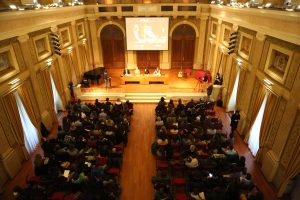
© Gianni Peresson
Throughout the year we are planning to organize some highly engaging Reading in the Dark events as well, through which Fondazione LIA make participants aware of issues such as accessibility and the socio-cultural inclusion of people with visual impairments. During a reading in the dark the author reads a passage from the book and the blind reader continues reading with the e-book in the LIA Foundation catalog through different modes: magnifying the characters, using the Braille display or the text to speech functionality of tablets and smartphones. Antonio Manzini, author of Orfani Bianchi had this to say about Reading in the Dark:
I’ve been to the Lia Foundation Reading in the Dark. There were two boys reading. Their voices resounded in that huge room and gave life to the characters, the dialogues, the descriptions. We were able to see trenches, Africa, we saw the music and jealousy and a single Romanian carer in a ruthless Rome. They read as Gods, and they did it with the soul and with the hands, because those two boys did not see. And they gave us a breathtaking view.
Details of all of these events will be available via Inclusive Publishing.
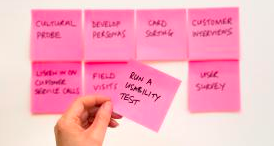 The LIA Foundation recently organized a day completely dedicated to the theme of accessibility for professionals in the publishing world and for content producers at the Talent Garden Calabiana in Milan , as part of the MiCA project—Milan for Accessible Culture.
The LIA Foundation recently organized a day completely dedicated to the theme of accessibility for professionals in the publishing world and for content producers at the Talent Garden Calabiana in Milan , as part of the MiCA project—Milan for Accessible Culture.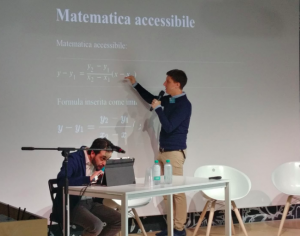
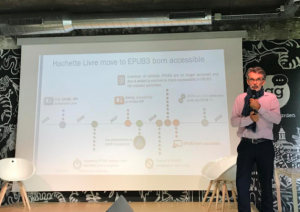


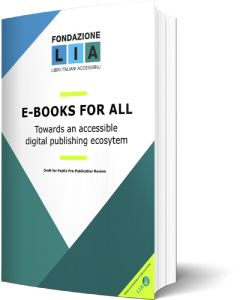 EBooks for All: A New Whitepaper Publication from The LIA Foundation in Italy
EBooks for All: A New Whitepaper Publication from The LIA Foundation in Italy


 After many years of fruitful collaboration,
After many years of fruitful collaboration,